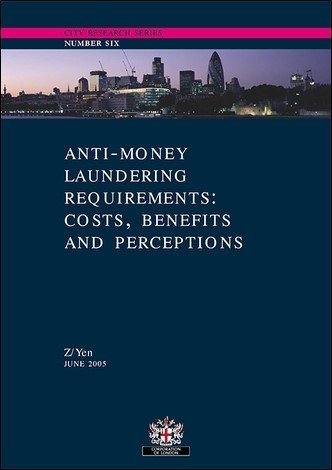Authors
Mark Yeandle, Professor Michael Mainelli, Adrian Berendt, and Brian Healy
Sponsored by
- City of London
Published by
City Research Series, Corporation of London, Institute of Chartered Accountants in England and Wales, ICAEW, 71 Pages.
Share on social media:

You might also be interested in:
Anti-Money Laundering Requirements: Costs, Benefits & Perceptions
Today sees the release of a new report which gives a fascinating insight into the fight against Money Laundering. Commissioned jointly by the Corporation of London and the Institute of Chartered Accountants in England & Wales, and carried out by Z/Yen Limited, the main findings are:
- International requirements on anti-money laundering are implemented more rigorously in the UK than in other jurisdictions and the related costs are higher;
- The high costs in the UK do not generate greater benefits to UK-based organisations;
- Despite the high costs in the UK, the fight against money-laundering is not seen as more effective in deterring or detecting money laundering;
- The UK has not yet become competitively disadvantaged due to the high costs but it is approaching a tipping point;
- The UK can become more effective at deterring money laundering by raising the perceived likelihood of money launderers being caught and the perceived severity of the punishments;
- It seems likely that other jurisdictions will incur greater costs in the future as they raise the level of their regulations towards the UK level.
The effectiveness of the efforts against money-laundering can be enhanced by closing regulatory and communication gaps. Areas of communications which, if improved, could yield significant results in terms of practicality and effectiveness include:
- Joined-Up Intelligence: Insufficient resources are aimed at this. Many professionals believe that the regulations could be more effective with a collective pooling of intelligence about money-laundering activity. In the UK, the National Criminal Intelligence Service has a very important role in collecting intelligence but currently does not have sufficient resources to perform this role as effectively as it might;
- Feedback to financial services institutions regarding the quality and quantity of their reporting appears to be inadequate;
- Publicity of successful convictions and asset seizures should be given a far higher profile.
Mark Yeandle of Z/Yen Limited commented:
"Greater effectiveness of the anti-money laundering regulations must be the main objective. If you improve effectiveness, prosecutions and asset seizures will become more frequent and can be made more visible. High profile prosecutions will deter money laundering and if this happens then I believe that anti-money laundering costs will be seen as less of a burden and a more acceptable price of doing business in a modern, civilised society".




